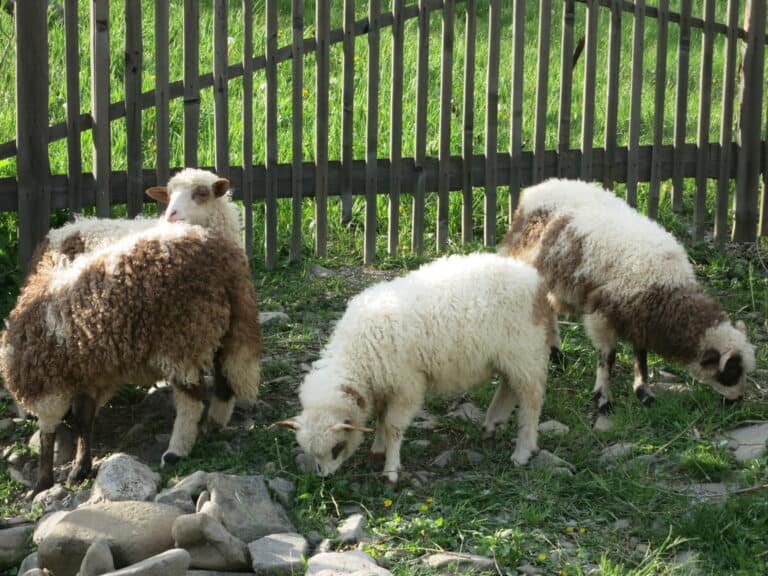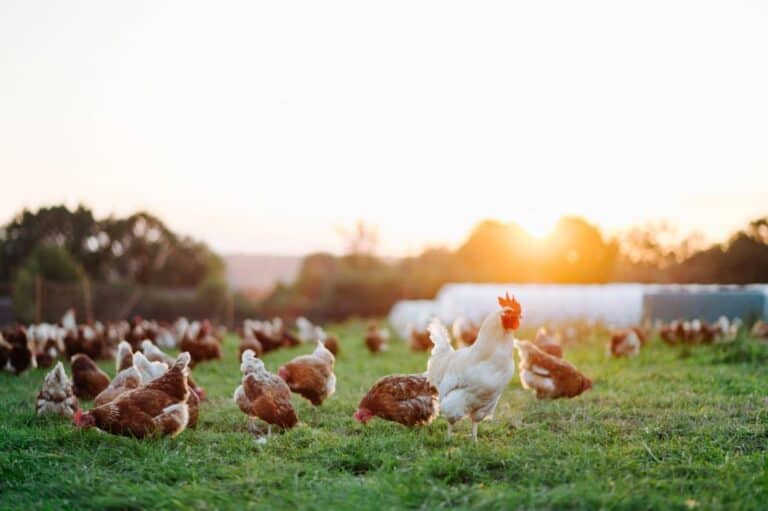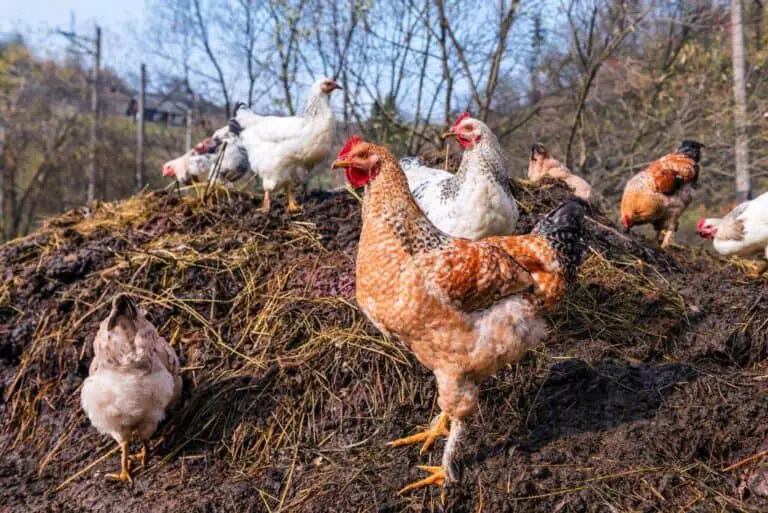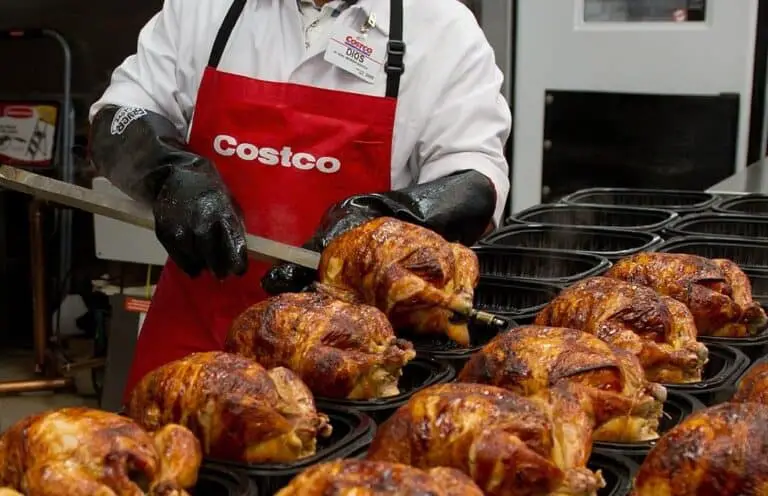How to Raise Free Range Chickens in Your Backyard or Garden: A Simple Guide
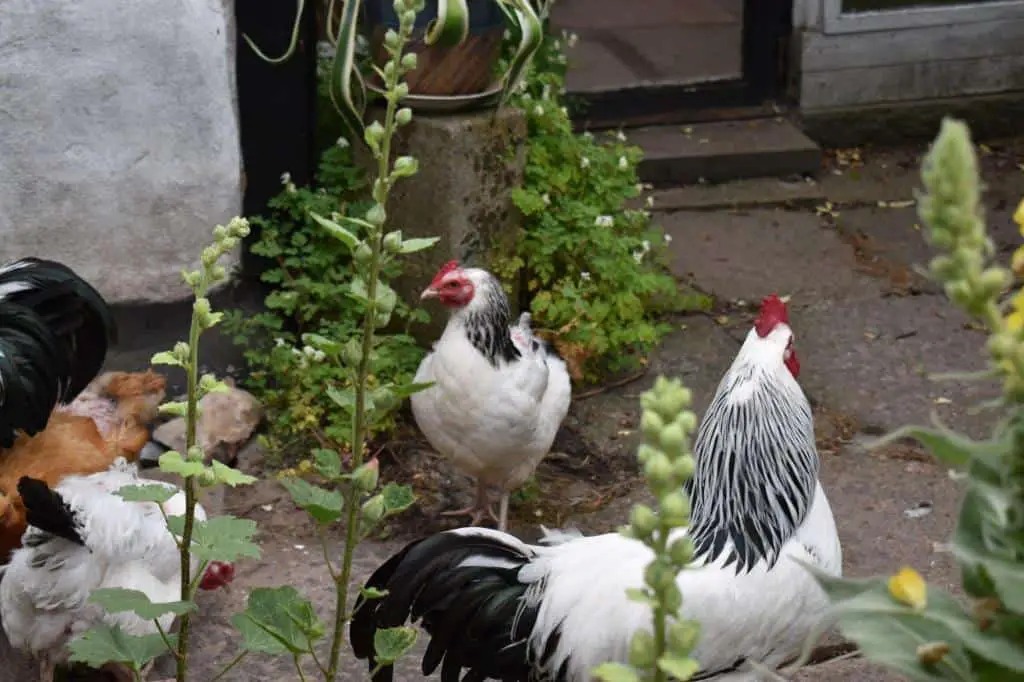
People are drawn to taking matters into their own hands in a world dominated by convenience and mass-produced goods. Imagine waking up to the soft clucking of backyard chickens and knowing that the eggs you collect from their nests are fresh and uncontaminated.
Imagine feeding your family wholesome meat that was not raised with antibiotics or hormones. Think of a garden full of life with these feathered friends enjoying their newfound freedom while keeping pests away.
Are you tired of buying factory-farmed eggs at the grocery store? Want to know how to raise your own free-range chickens in your backyard or garden? Look no further!
In this simple guide, we’ll walk you through the processes of planning and preparation, care and maintenance, egg collection and harvesting, and more. This article will explain everything you need to know about raising free-range chickens in your own backyard or garden.
Get ready to eat fresh, healthy eggs from your own backyard. This will help you reduce food waste and naturally keep pests away. Let’s get started!
What Exactly Are Free-Range Chickens?
Let us define free-range chickens and why it is important before we start this exciting plan. Allowing chickens to roam freely contrasts with factory farming, where animals are cramped. You can recreate their natural habitat by giving them sunlight, fresh air, and insect- and plant-rich pastures to peck at. At the same time, it enhances their overall well-being.
Free-range chickens are chickens that have access to the outdoors rather than being confined to a coop or enclosure. This means that they are able to move around freely and forage for food, which is believed to be a more natural and healthy way of raising chickens.
Free-range chickens also lay healthier eggs because they can eat a variety of foods, like bugs, seeds, and greens.
Determining if Your Yard is Suitable for Raising Free Range Chickens
One of the first steps in successfully raising free range chickens is assessing whether your yard is suitable for this type of farming. There are several factors to consider, such as the size of your yard, fencing requirements, and any zoning regulations that may apply.
The size of your yard will play a crucial role in determining the number of chickens you can comfortably raise. The general rule of thumb is to allow at least 10 square feet per bird to roam freely. This ensures they have enough space to exercise and explore their surroundings without feeling cramped or stressed.
Fencing requirements are another essential consideration when it comes to keeping free range chickens. A sturdy fence serves multiple purposes: it keeps your birds safe from predators, prevents them from wandering off into neighboring properties (and potentially causing disputes with neighbors), and helps maintain a clear boundary between your property and surrounding areas.
Make sure the fence stands at an appropriate height and has small enough gaps or holes so that chickens cannot escape and larger predators cannot enter.
Zoning regulations may vary depending on where you live, so it’s important to check local laws before embarking on your chicken-raising adventure. Some municipalities may have restrictions on keeping livestock within certain residential zones or impose limits on flock sizes based on lot size. Familiarize yourself with these regulations beforehand to avoid any legal complications down the line.
By thoroughly considering these factors upfront, you can determine if your yard is well-suited for housing free range chickens while also ensuring both their safety and compliance with local rules and regulations.
Benefits of Raising Free Range Chickens in Your Backyard or Garden
Below are some benefits of raising free range chickens in your backyard or garden
- Fresh eggs. By raising your own chickens, you will have a constant supply of fresh eggs that are free from harmful chemicals and pesticides.
- Natural pest control: Free range chickens will help to control pests in your garden by eating insects and other small animals.
- Fertilizer. Chicken manure is an excellent fertilizer for your garden, providing essential nutrients for your plants.
- Food waste reduction. You can feed your chickens food scraps and kitchen waste, which reduces the amount of food that ends up in landfills.
- Educational. Raising chickens can be a fun and educational experience for children and adults alike. It can teach about responsibility and sustainable living
- Cost-effective. Once your coop and fencing is built and your chickens are purchased, the cost of raising chickens is relatively low.
Free Range Chickens Compared to Broiler Chickens
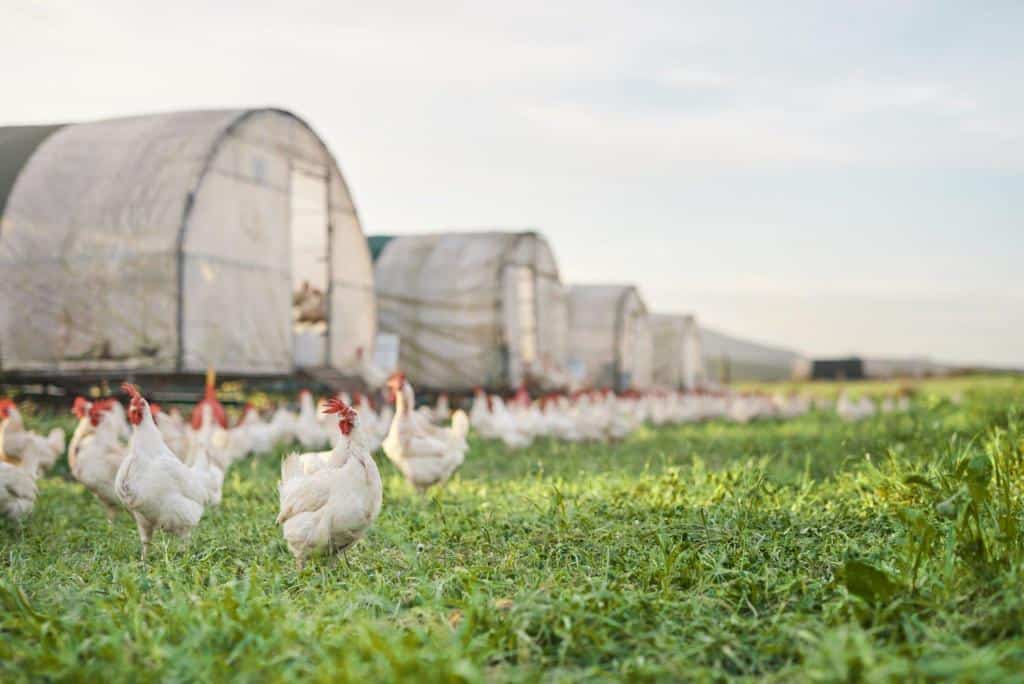
Free-ranging chickens are indeed happy and healthy. When free to roam and forage in a large area, chickens can scratch for food, take dust baths, and look for bugs. This keeps them not only physically active but also mentally active, which is important for their overall health.
When chickens are free to roam, they can eat a variety of foods, such as plants, seeds, and insects. This gives them a balanced diet, which is important for their growth, egg production, and overall health. Foraging for food also helps them digest better and can help them avoid health problems like being overweight or having digestive problems.
Additionally, free-ranging chickens are exposed to natural sunlight, which is essential for their health. With the help of vitamin D from the sun, chickens can take in calcium better and build strong bones. It also keeps their feathers shiny and prevents health issues like feather pecking, which is common in chickens kept in small spaces.
Chickens that are free to roam use natural dust bathing spots to keep their feathers clean and healthy and to get rid of parasites like mites and lice. This is a natural behavior that is essential for their overall health and well-being.
Planning and Preparation to Raise Free Range Chicken
Raising free-range chickens requires more than just a few birds and a patch of grass. It takes planning and preparation to create an ideal environment for these animals.
1. Choosing the Right Breeds for Your Climate and Space
When choosing the breeds of chickens to raise, you need to consider your climate and the amount of space you have available. Some chicken breeds are better suited to hot climates, while others are better for colder temperatures.
Some of the most popular breeds for free-ranging are Silver Spangled Hamburgs, White Leghorns, Anconas, Buckeyes, and Egyptian Fayoumis. Some breeds are larger and need more space to roam, while others are smaller and can be kept in smaller coops in backyards.
When choosing free-range chickens, choose the individual characteristics of each breed that meet your needs. Do your own research on different breeds and their specific needs before making a decision.
2. Building a Coop and Fencing
A coop is a necessary structure for providing shelter and protection for your chickens. It should be well-ventilated, easy to clean, and large enough to provide enough space for your chickens to move around and roost.
When building a coop, you should consider the size, materials, and location. You’ll also need to have a fencing system that will keep your chickens in and predators out.
A fence at least 4 feet high is recommended, while 250 to 300 square feet per chicken is a rule of thumb for free-range space. For ideal free-range conditions, each chicken should have at least 25 square feet of outside space without a run keeping them in.
3. Setting up a Feeding and Watering System
Proper feeding and watering are essential for the health and well-being of your chickens. Chickens need access to fresh water at all times.
You should have a system in place to ensure that their water is clean and free from contaminants. A feeding system should be easy to use and should be able to provide enough food for all of your chickens. Make a proper plan for the type of food you will be providing, as different breeds of chicken have different dietary needs.
Care and Maintenance for Raise Free Range Chicken
1. Feeding and Watering Chickens
Chickens need to be fed and given water every day for their health and well-being. Chickens should have access to fresh water at all times. Water is needed to clean and refill their water containers on a regular basis.
Chickens also need a balanced diet that includes a variety of grains, proteins, and greens. You can feed them with commercial feed, or you can give them kitchen scraps, fresh fruits, and vegetables, and also let them forage for insects in the yard.
2. Providing Shelter and Protection From Predators
Chickens need a safe and secure place to sleep and lay eggs, and it’s important to provide them with a coop that is well-ventilated and easy to clean. The coop should be large enough to provide enough space for all of your chickens to move around and roost comfortably. You also need to have predator-proof fencing that will keep your chickens in and predators out.
3. Maintaining a Clean Coop and Living Area for Chickens
A clean living area is essential for the health and well-being of your chickens. Keep the coop and surrounding area clean by removing manure and any spoiled food on a regular basis. This will help prevent the spread of disease and parasites and will also help control odors. You also want to make sure that your chickens have access to plenty of fresh air and sunlight.
| Related: How to Compost Chicken Manure |
Egg Collection and Harvesting
1. Collecting Eggs From the Coop
Collecting eggs from the coop is a daily task that should be done in the morning and in the evening, as chickens typically lay eggs in the morning and evening. When collecting eggs, it’s important to handle them gently to avoid cracking or damaging the shells. To prevent the eggs from becoming dirty or broken by other chickens, you should regularly check the nests for eggs and remove them as soon as possible.
2. Storing Eggs Properly
Eggs should be stored in a cool, dry place, ideally between 55 and 60°F. Put them in a clean, dry container, preferably with a lid, to keep moisture and odors at bay.
You can store eggs in the refrigerator, but that refrigeration can cause the eggs to lose some of their natural moisture and flavor. To get the best result, you should use the eggs within a week of collecting them.
Egg collection and harvesting are important aspects of raising free-range chickens. By collecting eggs often and keeping them in the right place, you can make sure you always have fresh eggs to use and enjoy.
How Do You Keep Free Range Chickens From Flying Away?
Keeping free-range chickens from flying away can be a challenge for many backyard chicken owners. However, the best way to prevent your chickens from flying away is to keep them happy and content.
Chickens are naturally curious, and if they have the chance, they will explore their surroundings. If your backyard chickens are given a comfortable coop, places to perch, and regular food and water sources, they will have no desire to leave.
The coop is the chickens’ home base and should be a safe and secure place for them to sleep and lay eggs. It should be well-ventilated, dry, and free from predators.
A good coop should also have places for the chickens to perch, as chickens love to roost at night. A good perch should be about 2-3 feet off the ground and about 12 inches wide.
Can You Raise Chickens Free Range Without a Fence?
Raising chickens without a fence is possible, but it does come with certain challenges and risks. Free-range chickens are allowed to roam around and forage for food in a large area rather than being confined to a small coop or pen. Chickens can easily become lost and are more vulnerable to harm from predators without a fence.
One way to keep your chickens safe without a fence is to supervise them while they are outside. This means you will have to be there while they are looking for food and be ready to help if a predator comes close.
This can be time-consuming and may not be practical for everyone. Another way is to use a predator-proof chicken run or pen, which can be opened during the day to allow the chickens to forage but closed at night to keep them safe.
Another disadvantage of raising free-range chickens without a fence is that they may wander off and become lost. Chickens do not have a strong sense of direction, and they may not be able to find their way back home if they wander too far.
It may be challenging to locate a lost chicken, and if it does, a predator might harm or kill it.
| Depending on the location and laws, having free-range chickens without a fence may be illegal or in violation of local zoning codes. Please check with your local government before deciding to raise chickens without a fence. |
Why Should You Divide Backyard and Garden?
To keep your chickens safe and your plants healthy, you need to divide your backyard and garden in the right way.
First, it’s important to give your chickens a place to roam and look for food. This area should be fenced off to keep the chickens contained and protect them from predators. It should also include a coop or shelter for the chickens to roost in at night. To prevent chicken waste buildup, this area should be large enough to house your desired number of chickens and cleaned regularly.
Next, consider the impact that chickens can have on your garden. Chickens love to scratch and dig, and they can quickly destroy a garden if given the chance. To prevent this, you can create a separate area for your garden that is protected by a fence or other barrier. This will keep your chickens out of the garden and allow your plants to grow without being disturbed.
Consider incorporating raised beds or containers in your garden to further protect your plants. This will keep the chickens from getting to the soil and digging up the roots of your plants. Additionally, you can grow vegetation that chickens will not typically eat, like marigolds or daffodils.
Conclusion
In conclusion, successfully raising free-range chickens in your backyard requires careful planning and commitment, but the rewards are plentiful. By creating a suitable environment for them to roam freely, providing adequate shelter and protection from predators, offering a nutritious diet, and conducting regular health checks, you can enjoy fresh eggs and the joy of watching these charming birds thrive.
Remember to consider factors such as local regulations, space requirements, predator-proofing measures, and appropriate flock size when starting out. Maintaining good hygiene practices within the coop area will go a long way in preventing diseases and ensuring healthy birds. Additionally, supplementing their natural foraging with kitchen scraps or organic feed can help provide balanced nutrition.
Don’t let any difficulties that may arise along the way demotivate you. Many poultry enthusiasts find immense satisfaction in raising free-range chickens as they witness firsthand their happy clucking and amusing antics while enjoying delicious farm-fresh eggs.
So why not take that first step towards embracing this rewarding experience? Whether you’re looking to lead a more sustainable lifestyle or simply want some delightful feathered companions in your yard, raising free range chickens is an enriching endeavor that connects us with nature’s rhythms while providing tangible benefits right at our doorstep. Join the growing community of backyard chicken keepers today!


